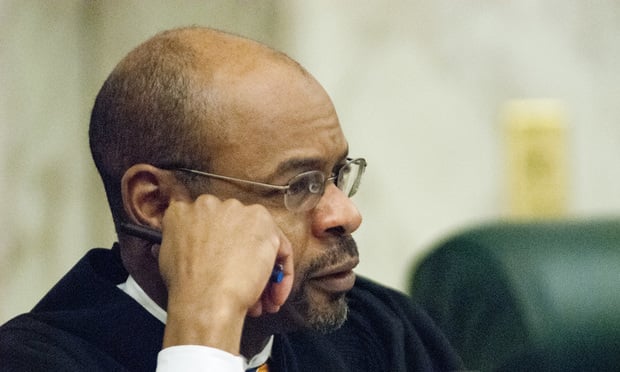Here's What Did Not Happen With Chrysler's $40M Judgment
Chrysler would have had to file its motion by 11:59 p.m. Monday to ask the Georgia Supreme Court to reconsider the $40 million judgment for the family of Remi Walden.
March 27, 2018 at 12:58 PM
6 minute read

FCA Chrysler's deadline to file a motion for reconsideration with the Georgia Supreme Court on a $40 million judgment passed Monday night with no action.
Chrysler would have had to file its motion by 11:59 p.m. Monday to have the judgment reconsidered, according to Georgia Supreme Court Public Information Officer Jane Hansen. No electronic filing was received.
The company's spokesman did not have an immediate response to an inquiry about its plans in the case.
On March 15, the Georgia Supreme Court upheld the award for the family of 4-year-old Remi Walden, who died when his family's Jeep burst into flames after it was hit from behind. The Jeep's rear-mounted gas tank was the target of his parents' lawsuit.
The case has been closely watched by business groups, who urged the high court to upend the award. Although that didn't happen, the justices did offer some take-home advice to other lawyers to proceed with caution.
Justice Britt Grant wrote the opinion, parsing through the state's new evidence code. All the justices concurred with parts of the decision, but five of the nine differed on some points. Still, the end result was a 9-0 vote upholding Decatur County Superior Court Judge J. Kevin Chason's decision to slash the award to $40 million after a jury reached a $150 million verdict.
On the winning side is a legal team led by plaintiffs attorney James “Jim” Butler Jr. of Butler Wooten & Peak in Atlanta and Columbus. Butler was trying another wrongful death product liability case against Ford, and was unavailable for comment on the Walden judgment Tuesday.
Butler tried the Walden case with his son, James “Jeb” Butler III of Butler Tobin. The Butler trial team also included: George Floyd of Bainbridge; Cathy Cox, now dean of the Mercer University law school; David Rohwedder of Butler Wooten; and Beth Glen, senior paralegal at Butler Wooten. Michael Terry and Frank Lowrey of Bondurant Mixson & Elmore worked with the Butlers on the appeal.
“Remi died by fire 6 years ago this month,” Butler said in an email after the March 15 opinion was released. “Remi's parents and their legal team hope this is the end of it. We thank all the judges who devoted such time and effort to this case.”
Chrysler indicated an interest in asking the U.S. Supreme Court to take a look. “FCA US is disappointed in this decision. We are considering our legal options,” a corporate spokesman said by email March 16.
And the company pointed to its long-held contention that the true cause of the child's death was the other driver and not the placement of the gas tank behind the axle—a design which was later changed, with the tank moved to the middle of the vehicle.
“The company continues to extend sympathies to the family of Remi Walden for their loss,” Chrysler said. “This tragic crash was caused by a reckless pick-up truck driver who slammed into the rear of a 1999 Jeep Grand Cherokee at highway speed.”
Following a nine-day trial in Bainbridge, the jury awarded the boy's parents $120 million for wrongful death, and $30 million for the child's pain and suffering. The verdict apportioned 1 percent of the fault to the other driver and 99 percent to Chrysler. The company filed a motion for new trial, which Chason denied on the condition that the parents accept a lower wrongful death verdict of $30 million and a pain and suffering verdict of $10 million, which they did. Chrysler then appealed to the Georgia Court of Appeals, but the state's intermediate appellate court upheld the trial court's judgment.
The Supreme Court upheld Chason as well, and now has not been asked to reconsider. But the high court's opinion came with a note of caution for judges and lawyers.
Chrysler's lead appellate counsel on the case is Thomas Dupree Jr., a Washington, D.C.-based partner with Gibson, Dunn & Crutcher. Dupree hung his oral argument for granting Chrysler a new trial on the company's objection to his opponent bringing up CEO Sergio Marchionne's $68 million-a-year compensation. Dupree complained to the Supreme Court in oral arguments last October that Butler wrote the CEO's pay on a “giant” board in front of the jury.
But the high court ruled that Chrysler's trial counsel did not make a proper objection at the time to form a basis for reversal.
“We cannot say that the prejudicial effect of the evidence so far outweighed its probative value that its admission was clear and obvious reversible error,” Grant wrote in the opinion upholding the $40 million judgment. Rather, she said, judges must determine whether compensation evidence is admissible.
However, Presiding Justice Harold Melton wrote in his own concurrence that “the outcome here could very well have been different” had Chrysler's lawyers made a proper objection to the emphasis on the CEO's pay.
“I would caution the bench and bar to be wary of the use of employee compensation evidence as a means of showing a witness' bias, because such evidence can be highly inflammatory and lead to unfair prejudice, and because there are other ways to show an employee's potential bias without referencing their actual income,” said Melton, who is expected to become chief justice later this year.
“Indeed, the plaintiffs specifically encouraged the jury to use Chrysler's CEO's income as a reference point for calculating its compensatory damages award,” Melton said. “In order to reduce the risk of such abuses occurring, in those rare cases where employee compensation may be relevant to an issue presented at trial, I would encourage trial courts to use limiting instructions as an additional tool to blunt any potential prejudice and to direct the jury's attention to the limited purpose for which the evidence should be considered.”
The case is Chrysler v. Walden, No. S17G0832.
This content has been archived. It is available through our partners, LexisNexis® and Bloomberg Law.
To view this content, please continue to their sites.
Not a Lexis Subscriber?
Subscribe Now
Not a Bloomberg Law Subscriber?
Subscribe Now
NOT FOR REPRINT
© 2025 ALM Global, LLC, All Rights Reserved. Request academic re-use from www.copyright.com. All other uses, submit a request to [email protected]. For more information visit Asset & Logo Licensing.
You Might Like
View All

On The Move: Ex-Partner Returns to Lead Nelson Mullins Corporate Group, Burr & Forman Hires University GC as COO
5 minute read
Law Firm Sued for Telemarketing Calls to Customers on Do Not Call Registry

Evidence Explained: Prevailing Attorney Outlines Successful Defense in Inmate Death Case
Trending Stories
- 1We the People?
- 2New York-Based Skadden Team Joins White & Case Group in Mexico City for Citigroup Demerger
- 3No Two Wildfires Alike: Lawyers Take Different Legal Strategies in California
- 4Poop-Themed Dog Toy OK as Parody, but Still Tarnished Jack Daniel’s Brand, Court Says
- 5Meet the New President of NY's Association of Trial Court Jurists
Who Got The Work
J. Brugh Lower of Gibbons has entered an appearance for industrial equipment supplier Devco Corporation in a pending trademark infringement lawsuit. The suit, accusing the defendant of selling knock-off Graco products, was filed Dec. 18 in New Jersey District Court by Rivkin Radler on behalf of Graco Inc. and Graco Minnesota. The case, assigned to U.S. District Judge Zahid N. Quraishi, is 3:24-cv-11294, Graco Inc. et al v. Devco Corporation.
Who Got The Work
Rebecca Maller-Stein and Kent A. Yalowitz of Arnold & Porter Kaye Scholer have entered their appearances for Hanaco Venture Capital and its executives, Lior Prosor and David Frankel, in a pending securities lawsuit. The action, filed on Dec. 24 in New York Southern District Court by Zell, Aron & Co. on behalf of Goldeneye Advisors, accuses the defendants of negligently and fraudulently managing the plaintiff's $1 million investment. The case, assigned to U.S. District Judge Vernon S. Broderick, is 1:24-cv-09918, Goldeneye Advisors, LLC v. Hanaco Venture Capital, Ltd. et al.
Who Got The Work
Attorneys from A&O Shearman has stepped in as defense counsel for Toronto-Dominion Bank and other defendants in a pending securities class action. The suit, filed Dec. 11 in New York Southern District Court by Bleichmar Fonti & Auld, accuses the defendants of concealing the bank's 'pervasive' deficiencies in regards to its compliance with the Bank Secrecy Act and the quality of its anti-money laundering controls. The case, assigned to U.S. District Judge Arun Subramanian, is 1:24-cv-09445, Gonzalez v. The Toronto-Dominion Bank et al.
Who Got The Work
Crown Castle International, a Pennsylvania company providing shared communications infrastructure, has turned to Luke D. Wolf of Gordon Rees Scully Mansukhani to fend off a pending breach-of-contract lawsuit. The court action, filed Nov. 25 in Michigan Eastern District Court by Hooper Hathaway PC on behalf of The Town Residences LLC, accuses Crown Castle of failing to transfer approximately $30,000 in utility payments from T-Mobile in breach of a roof-top lease and assignment agreement. The case, assigned to U.S. District Judge Susan K. Declercq, is 2:24-cv-13131, The Town Residences LLC v. T-Mobile US, Inc. et al.
Who Got The Work
Wilfred P. Coronato and Daniel M. Schwartz of McCarter & English have stepped in as defense counsel to Electrolux Home Products Inc. in a pending product liability lawsuit. The court action, filed Nov. 26 in New York Eastern District Court by Poulos Lopiccolo PC and Nagel Rice LLP on behalf of David Stern, alleges that the defendant's refrigerators’ drawers and shelving repeatedly break and fall apart within months after purchase. The case, assigned to U.S. District Judge Joan M. Azrack, is 2:24-cv-08204, Stern v. Electrolux Home Products, Inc.
Featured Firms
Law Offices of Gary Martin Hays & Associates, P.C.
(470) 294-1674
Law Offices of Mark E. Salomone
(857) 444-6468
Smith & Hassler
(713) 739-1250






